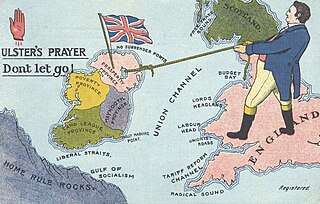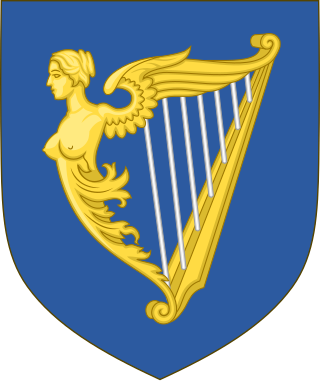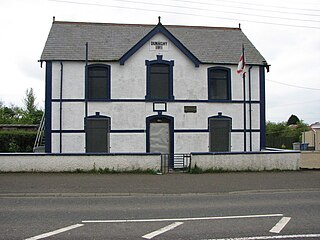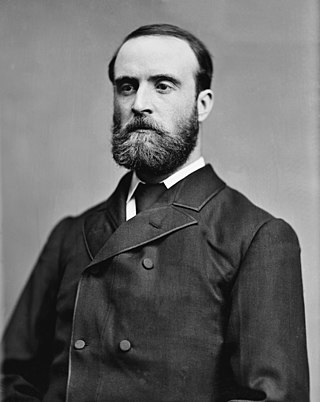Related Research Articles

The Ulster Unionist Party (UUP) is a unionist political party in Northern Ireland. The party was founded in 1905, emerging from the Irish Unionist Alliance in Ulster. Under Edward Carson, it led unionist opposition to the Irish Home Rule movement. Following the partition of Ireland, it was the governing party of Northern Ireland between 1921 and 1972. It was supported by most unionist voters throughout the conflict known as the Troubles, during which time it was often referred to as the Official Unionist Party (OUP).
The Liberal Unionist Party was a British political party that was formed in 1886 by a faction that broke away from the Liberal Party. Led by Lord Hartington and Joseph Chamberlain, the party established a political alliance with the Conservative Party in opposition to Irish Home Rule. The two parties formed the ten-year-long coalition Unionist Government 1895–1905 but kept separate political funds and their own party organisations until a complete merger between the Liberal Unionist and the Conservative parties was agreed to in May 1912.

Andrew Bonar Law, PC was a British Conservative statesman and politician who served as Prime Minister of the United Kingdom from October 1922 to May 1923.

Unionism is a political tradition on the island of Ireland that favours political union with Great Britain and professes loyalty to the British Crown and constitution. As the overwhelming sentiment of Ireland's Protestant minority, following Catholic Emancipation (1829) unionism mobilised to keep Ireland part of the United Kingdom and to defeat the efforts of Irish nationalists to restore a separate Irish parliament. Since Partition (1921), as Ulster Unionism its goal has been to maintain Northern Ireland as part of the United Kingdom and to resist a transfer of sovereignty to an all-Ireland republic. Within the framework of a 1998 peace settlement, unionists in Northern Ireland have had to accommodate Irish nationalists in a devolved government, while continuing to rely on the link with Britain to secure their cultural and economic interests.

The Irish Parliamentary Party was formed in 1874 by Isaac Butt, the leader of the Nationalist Party, replacing the Home Rule League, as official parliamentary party for Irish nationalist Members of Parliament (MPs) elected to the House of Commons at Westminster within the United Kingdom of Great Britain and Ireland up until 1918. Its central objectives were legislative independence for Ireland and land reform. Its constitutional movement was instrumental in laying the groundwork for Irish self-government through three Irish Home Rule bills.

North Down is a parliamentary constituency in the United Kingdom House of Commons. The current MP is Stephen Farry of the Alliance Party. Farry was elected to the position in the 2019 general election, replacing the incumbent Sylvia Hermon. Hermon had held the position since being elected to it in the 2001 general election, but chose not to contest in 2019.
The Ulster Unionist Labour Association (UULA) was an association of trade unionists founded by Edward Carson in June 1918, aligned with the Ulster Unionists in Ireland. Members were known as Labour Unionists. In Britain, 1918 and 1919 were marked by intense class conflict. This phenomenon spread to Ireland, the whole of which was part of the United Kingdom at the time. This period also saw a large increase in trade union membership and a series of strikes. These union activities raised fears in a section of the Ulster Unionist leadership, principally Edward Carson and R. Dawson Bates. Carson at this time was president of the British Empire Union, and had been predisposed to amplify the danger of a Bolshevik outbreak in Britain.
The Ulster Liberal Party was a liberal and non-sectarian political party in Northern Ireland linked to the British Liberal Party. The party was officially neutral on the constitutional position of Northern Ireland. Members expressed different views on the issue but agreed that Northern Ireland could only join the Republic of Ireland if that was the wish of the majority of the people of Northern Ireland.

Walter Hume Long, 1st Viscount Long,, was a British Unionist politician. In a political career spanning over 40 years, he held office as President of the Board of Agriculture, President of the Local Government Board, Chief Secretary for Ireland, Secretary of State for the Colonies and First Lord of the Admiralty. He is also remembered for his links with Irish Unionism, and served as Leader of the Irish Unionist Party in the House of Commons from 1906 to 1910.

The Irish Unionist Alliance (IUA), also known as the Irish Unionist Party, Irish Unionists or simply the Unionists, was a unionist political party founded in Ireland in 1891 from a merger of the Irish Conservative Party and the Irish Loyal and Patriotic Union to oppose plans for home rule for Ireland within the United Kingdom of Great Britain and Ireland. The party was led for much of its existence by Colonel Edward James Saunderson and later by William St John Brodrick, Earl of Midleton. In total, eighty-six members of the House of Lords affiliated themselves with the Irish Unionist Alliance, although its broader membership among Irish voters was relatively small.

The Independent Loyal Orange Institution is an offshoot of the Orange Institution, a Protestant fraternal organisation based in Northern Ireland. Initially pro-labour and supportive of tenant rights and land reform, over time it moved to a more conservative, unionist position.

The Shadow Secretary of State for Northern Ireland is a member of the British Shadow Cabinet responsible for the scrutiny of the Secretary of State for Northern Ireland and their department, the Northern Ireland Office. The post is currently held by Peter Kyle.
The Irish Conservative Party, often called the Irish Tories, was one of the dominant Irish political parties in Ireland in the 19th century. It was affiliated with the Conservative Party in Great Britain. Throughout much of the century it and the Irish Liberal Party were rivals for electoral dominance among Ireland's small electorate within the United Kingdom of Great Britain and Ireland, with parties such as the movements of Daniel O'Connell and later the Independent Irish Party relegated into third place. The Irish Conservatives became the principal element of the Irish Unionist Alliance following the alliance's foundation in 1891.

Unionism in the United Kingdom, also referred to as British unionism, is a political stance favouring the continued unity of England, Scotland, Wales and Northern Ireland as one sovereign state, the United Kingdom of Great Britain and Northern Ireland. Those who support the union are referred to as "Unionists". Though not all unionists are nationalists, British unionism is associated with British nationalism, which asserts that the British are a nation and promotes the cultural unity of the Britons, which may include people of English, Scottish, Welsh, Irish, Cornish, Jersey, Manx and Guernsey descent.

The Irish Home Rule movement was a movement that campaigned for self-government for Ireland within the United Kingdom of Great Britain and Ireland. It was the dominant political movement of Irish nationalism from 1870 to the end of World War I.

The 1885 general election in Ireland was the first election following the Representation of the People Act 1884 and the Redistribution of Seats Act 1885, which redrew the Irish electoral landscape.
The Irish Loyal and Patriotic Union (ILPU) was a unionist political organisation in Ireland, established to oppose the Irish Home Rule movement.
References
- ↑ Jackson, Alvin, The Ulster Party: Irish unionists in the House of Commons, 1884-1911,p40
- 1 2 John F. Harbinson, The Ulster Unionist Party, 1882-1973, pp.7–9